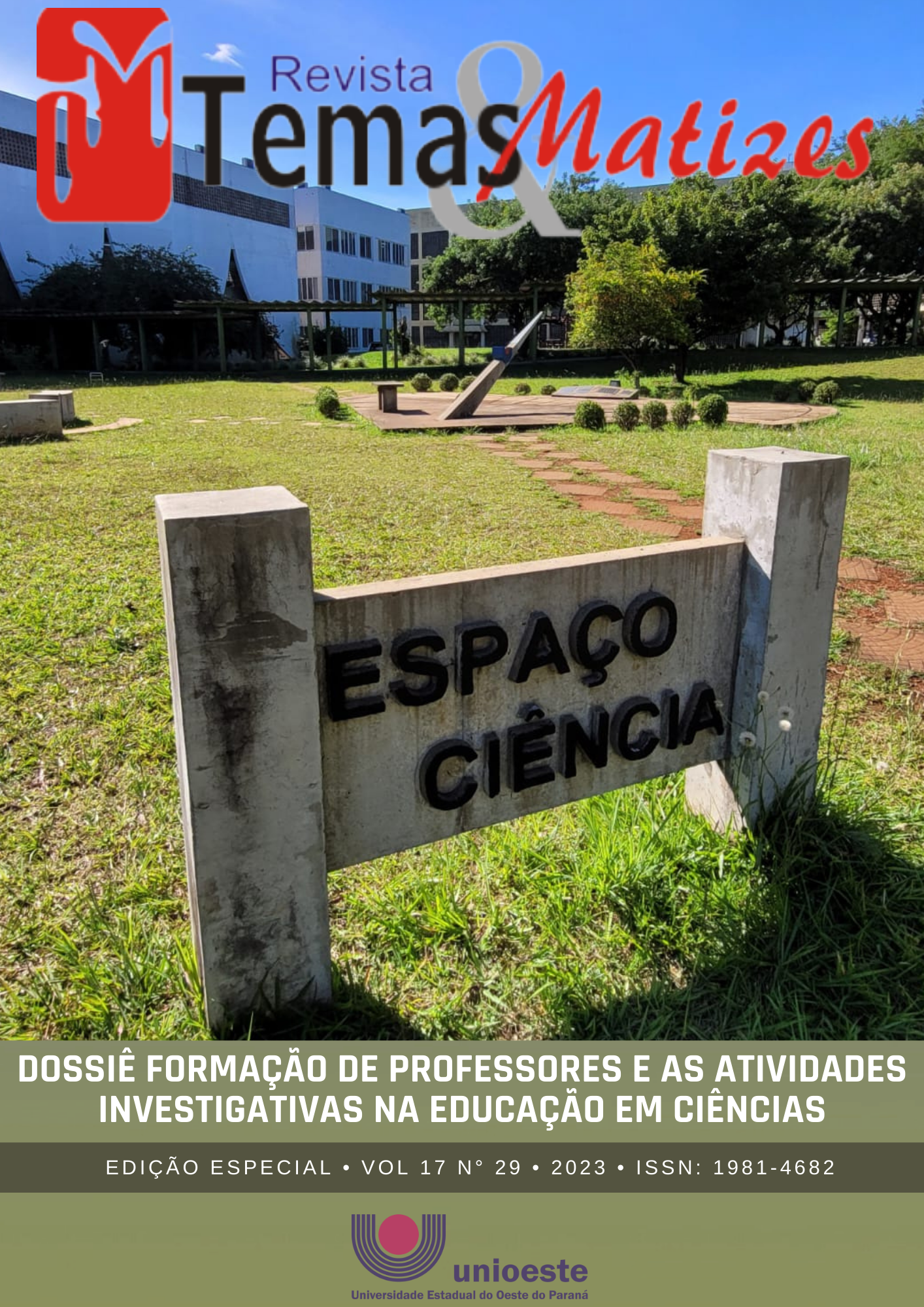Lei de Hooke: laboratório rotacional na formação inicial docente
DOI:
https://doi.org/10.48075/rtm.v17i31.31497Palavras-chave:
Plataforma PhET; Massas e Molas; Rigidez.Resumo
O laboratório rotacional é um modelo de ensino híbrido em que a rotação acontece entre um ambiente presencial e outro online, configurando-se como uma metodologia ativa de aprendizagem. Prevendo a multiplicação de saberes, foi proposta uma intervenção na formação inicial docente através do ensino híbrido, de forma que o conteúdo abordado foi a lei de Hooke. De forma prática, no laboratório de ensino de Física, foi discutido o conteúdo e suas aplicações a massas e molas, e de forma online, foram experimentadas diversas simulações da plataforma PhET no laboratório de informática. Os resultados mostram que os futuros docentes compreenderam a deformação de uma mola como inversamente proporcional à rigidez desta mola, bem como a associação de molas e resolução de problemas que estejam relacionados a lei de Hooke. A atividade em modelo híbrido de ensino permitiu entender as simulações como motivadoras de aprendizagem e que o laboratório rotacional aproxima teoria e prática de forma interativa.
Referências
BRITO, J. M. da S. A Singularidade Pedagógica do Ensino Híbrido. EaD em Foco, [S.l], v. 10, n. 1, p. 1-10, 2020. Disponível em: https://eademfoco.cecierj.edu.br/index.php/Revista/article/view/948/537. Acesso em: 29 jun. 2022.
CHRISTENSEN, C. M.; HORN, M. B.; STAKER, H. Ensino híbrido: uma inovação Disruptiva? Uma introdução à teoria dos híbridos. Clayton Christensen Institute for Disruptive Innovation. Tradução Fundação Lemann e Instituto Península, 2013. Disponível em: https://www.pucpr.br/wp-content/uploads/2017/10/ensino-hibrido_uma-inovacao-disruptiva.pdf. Acesso em: 30 jun. 0222.
DEROSSI, C. C.; FERREIRA, K. L. M. Apontamentos teóricos sobre a formação continuada e os modelos formativos de professores e professoras. Educação & Linguagem, [S.l.], v. 7, n. 2, p. 13-23, 2020. Disponível em: https://www.fvj.br/revista/wp-content/uploads/2021/02/2_REdLi_2020.2.pdf. Acesso em: 29 jun. 2022.
HOLANDA, I. N.; COSTA, F. E. M. A utilização remota do phet como instrumento facilitador do ensino-aprendizagem da lei de Hooke. Educação & Linguagem, [S.l.], v. 8, n. 3, p. 39-50, 2021. Disponível em: https://www.fvj.br/revista/wp-content/uploads/2022/05/4_REdLi_2021.3.pdf. Acesso em: 29 jun. 2022.
LAVOR, O. P.; OLIVEIRA, E. A. G. Grandezas proporcionais: sequência didática na formação inicial de professores. REAMEC - Rede Amazônica de Educação em Ciências e Matemática, [S.l.], v. 10, n. 1, p. e22014, 2022a. Disponível em: https://periodicoscientificos.ufmt.br/ojs/index.php/reamec/article/view/13476. Acesso em: 27 jun. 2022.
LAVOR, O. P.; OLIVEIRA, E. A. G. Sequência didática interativa na discussão do conceito de energia. REAMEC - Rede Amazônica de Educação em Ciências e Matemática, [S.l.], v. 10, n. 1, p. e22011, 2022b. Disponível em: https://periodicoscientificos.ufmt.br/ojs/index.php/reamec/article/view/13122. Acesso em: 28 jun. 2022.
MORAN, J. Metodologias ativas e modelos híbridos na educação. In: YAEGASHI, S. et al. (ORG.). Novas Tecnologias Digitais: Reflexões sobre mediação, aprendizagem e desenvolvimento. Curitiba: CRV, 2017. p.23-35.
MOREIRA, M. A. Desafios no ensino da física. Revista Brasileira de Ensino de Física, [S.l.], v. 43, p. e20200451, 2021. Supl. 1. Disponível em: https://www.scielo.br/j/rbef/a/xpwKp5WfMJsfCRNFCxFhqLy/?format=pdf&lang=pt. Acesso em: 27 jun. 2022.
PINTO, E. O. de T. P.; BROD, F. A. T. Apoio pedagógico nos anos iniciais a partir do modelo laboratório rotacional de ensino híbrido.
Revista Eletrônica de Educação, [S.l.], v. 14, p. 1-20, 2020. Disponível em: http://www.reveduc.ufscar.br/index.php/reveduc/article/view/2849/1023. Acesso em: 30 jun. 2022.
SOUZA, L. R. de; SOARES, E. B. da S.; OLIVEIRA, G. F. B. de. Ensinando matemática financeira com tecnologias: uma experiência utilizando laboratório rotacional em tempos de ensino remoto. Revista Paranaense de Educação Matemática, [S.l.], v. 10, n. 22, p. 551–570, 2021. DOI: 10.33871/22385800.2021.10.22.551-570. Disponível em: http://200.201.12.34/index.php/rpem/article/view/6293. Acesso em: 30 jun. 2022.
Downloads
Publicado
Como Citar
Edição
Seção
Licença

Este trabalho está licenciado sob uma licença Creative Commons Attribution-NonCommercial-ShareAlike 4.0 International License.
Aviso de Direito Autoral Creative Commons
Política para Periódicos de Acesso Livre
Autores que publicam nesta revista concordam com os seguintes termos:
1. Autores mantém os direitos autorais e concedem à revista o direito de primeira publicação, com o trabalho simultaneamente licenciado sob a Licença Creative Commons Attribution que permite o compartilhamento do trabalho com reconhecimento da autoria e publicação inicial nesta revista.2. Autores têm autorização para assumir contratos adicionais separadamente, para distribuição não-exclusiva da versão do trabalho publicada nesta revista (ex.: publicar em repositório institucional ou como capítulo de livro), com reconhecimento de autoria e publicação inicial nesta revista.
3. Autores têm permissão e são estimulados a publicar e distribuir seu trabalho online (ex.: em repositórios institucionais ou na sua página pessoal) a qualquer ponto antes ou durante o processo editorial, já que isso pode gerar alterações produtivas, bem como aumentar o impacto e a citação do trabalho publicado (Veja O Efeito do Acesso Livre).
Licença Creative Commons
Esta obra está licenciada com uma Licença Creative Commons Atribuição-NãoComercial-CompartilhaIgual 4.0 Internacional, o que permite compartilhar, copiar, distribuir, exibir, reproduzir, a totalidade ou partes desde que não tenha objetivo comercial e sejam citados os autores e a fonte.


